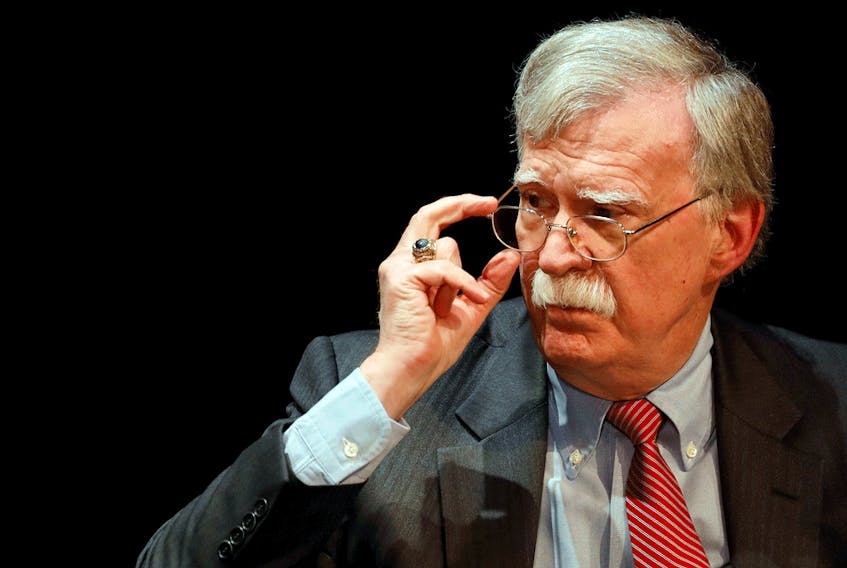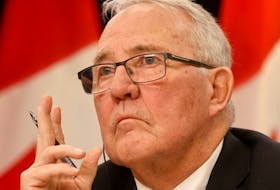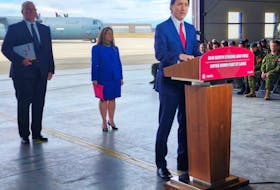Nobody could ever mistake John Bolton for a ray of sunshine. Yet Donald Trump’s former national security advisor is optimistic there will be a peaceful post-election transfer of power in the United States.
“No-one should have any view to the contrary. A president of the United States has to operate on the basis of fact and the current president is not operating on that basis. It’s corrosive and destructive and more people need to speak out. But ultimately the result will be what people voted for, it will be stable and it is not a threat to the constitutional system,” he told the State of the Union event held virtually by the Friends of Simon Wiesenthal Center in Toronto.
But Bolton, who resigned from the Trump Administration last year, was less positive about the geo-political world that president-elect Joe Biden will be obliged to manage.
Bolton said Trump had no coherent China policy and the U.S. is not prepared at a strategic level – economically, politically or militarily – to deal with this “existential question.”
“It’s not too late but we’re behind the curve,” he said.
China has an enviable economic growth rate, based on stolen intellectual property and forced technology transfer, that is enabling it to build up its military capability, its nuclear forces, a blue water navy and an “extraordinary” cyber warfare capacity, he said. “None of it is accidental and our response has been ad hoc and haphazard,” he said.
Bolton was speaking alongside retired U.S. general and former director of the Central Intelligence Agency David Petraeus.
“The challenge for authoritarian systems is that at a certain point in time, they no longer work because of too much state interference or corruption or other shortcomings. But the bottom line is the Chinese are performing very, very impressively,” Petraeus said. “The pandemic originated there but the first country to have a V-shaped recovery was China.”
Petraeus said what is needed is a “firm but not provocative” policy from the Biden administration that involves all America’s allies and partners. “You might describe it as ‘engage and influence’,” he said.
Event moderator Heather Reisman asked if the world is safer or not as a result of Trump pulling out of the Iran nuclear deal.
Petraeus said even the Israelis acknowledged the deal made them safer for 10 years. But it did not impact Iran’s ballistic missile program or limit its “malign activity” in the region, he said.
The Iranians restarted their nuclear program after Trump pulled out of the deal. “We can prevent that but obviously that carries a lot of risk,” said the former general.
One potential wild card is an Iranian shift toward China to evade U.S. economic sanctions. “This is going to have to be handled skillfully to make sure China is on-board with whatever the new administration decides to pursue,” he said.
Bolton said he is worried that Biden’s stated policy of re-engaging with the theocracy will result in “Iran deal 2.0”.
“Iran has not made the strategic decision to give up nuclear weapons and will continue with that objective, and to develop ballistic missile technology as a delivery system. I’m very worried going forward,” he said.
That same concern across the Arab world was the impetus behind the Abraham Accords that normalized relations between Israel, Bahrain and the United Arab Emirates. Bolton said the Arab countries concluded the threat of Iran was more important than the Palestinian issue. “It reflected certain concerns about America’s staying power in the region and the belief that growing closer to Israel is in everyone’s security interests,” he said. Sudan has also since normalized relations with Israel, and Bolton added that he expects other agreements to follow “sooner, rather than later.”
Petraeus said another positive factor for Israel is its cordial relationship with Egypt, which he said is “completely unparalleled.”
One of Biden’s major burdens will be disentangling the U.S. from “endless wars” without creating the conditions that spawned al-Qaeda and the Islamic State.
Petraeus, who commanded coalition forces in Afghanistan and Iraq, said he has advised both the Trump and income Biden administrations that, with its current “constellation” of drones, the U.S. is in a better position to maintain “sustained and sustainable” commitments, where the host nation does the bulk of the fighting, supported by American intelligence and logistics. “If you think about the U.S., surely we can keep 2,000 troops in Syria to help our partners who did the fighting on the frontlines? A superpower can sustain those kind of numbers very easily,” he said.
Reisman asked if he is optimistic that Biden will be comfortable with that kind of effort?
“That’s an open question,” Petraeus said. “As vice-president, he was part of an administration that withdrew forces when some of us questioned the wisdom of that.”
I’m very worried going forward
The retired general said security in Afghanistan has been “eroded before our eyes”, since Trump made clear his desire to withdraw.
“There’s no way you’re going to get a durable agreement when the enemy knows you want to leave,” he said.
But Biden said on the campaign trail that the U.S. should “end endless wars responsibly.”
“That’s a very important word,” said Petraeus. “It could translate into maintaining a sustained commitment … That has been my counsel.”
Bolton’s assessment was, characteristically, the most chilling of the night.
The former UN ambassador said the radical ideology that motivates terror remains strong. “I’m deeply concerned about the agreement in Afghanistan with the Taliban, not because the Afghan Taliban is a threat to the U.S. but because Afghanistan could return to being a venue, a host, for terrorists. What I fear most of all is the Pakistani Taliban radicals gaining control of Pakistan’s nuclear weapons, which is the greatest fear all of us should have about terrorism,” he said.
• Email: [email protected] | Twitter: IvisonJ
Copyright Postmedia Network Inc., 2020









